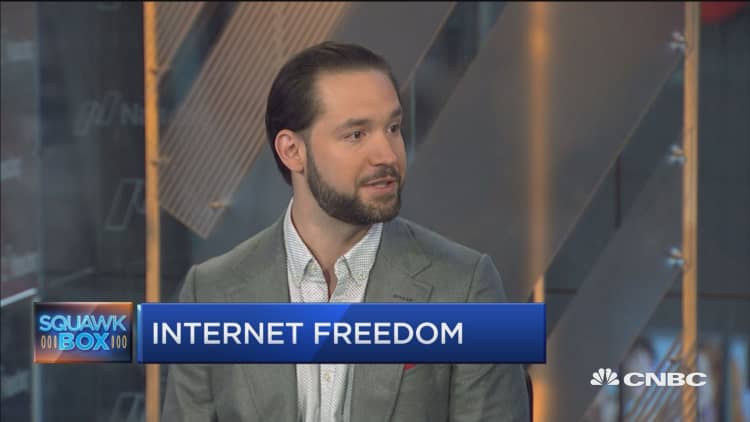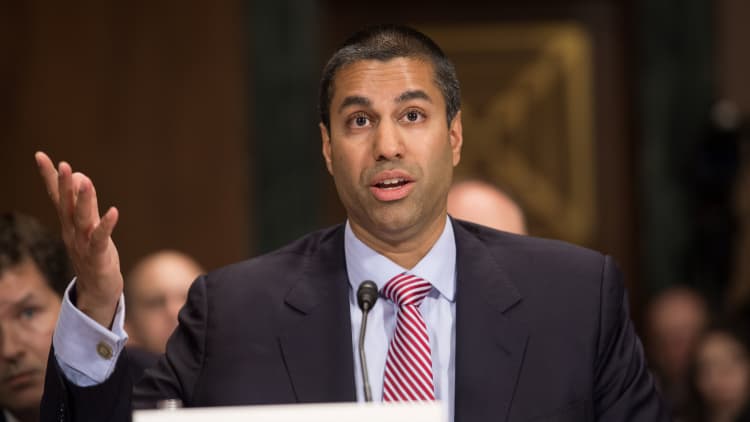A short-lived ceasefire over net neutrality is quickly coming to an end.
Silicon Valley is already rebelling against a plan by Republican FCC Chairman Ajit Pai that would cancel the government's net neutrality rules — and perhaps leave it to telecom giants like AT&T and Comcast to decide whether to adhere to open internet principles.
Under Pai's early blueprint, internet providers could be encouraged to commit in writing that they won't slow down or block internet traffic. If they break that promise, they could be penalized by another agency, the Federal Trade Commission, which can take action whenever companies deceive consumers, sources confirmed to Recode.
Pai's proposal hasn't officially been announced, and it obviously can change. If he pursues it, however, it would amount to a major break with his Democratic predecessor. During the Obama administration, the FCC wrote strong net neutrality protections into law, essentially subjecting the nation's telecom industry to utility-like regulation.
Many in Silicon Valley backed that approach — and now seem wary of Pai's plan to scrap it.
"I think in practice, it goes against everything we would want in strong net neutrality protections," said Evan Engstrom, the executive director of Engine, in an interview. The group works with startups on policy issues in San Francisco.
As a result, Engstrom said he expected a "similar level of engagement that we saw the last time around when we had to fight" — a vicious rhetorical war that drew even John Oliver into the fray. And he said the tech industry again would "do everything we can to rally the community and the public."

To that end, one of the Valley's lobbying voices in Washington, the Internet Association, will share its views privately with Pai at the FCC next week, according to a source familiar with the matter. The group, which represents the likes of Facebook, Google and Twitter, declined to comment on the meeting.
In a statement, though, a spokesman for the Internet Association told Recode:
"Internet companies are ready to fight to maintain strong net neutrality protections in any forum. ISPs must not be allowed to meddle with people's right to access content and services online and efforts to weaken net neutrality rules are bad for consumers and innovation."
Telecom giants are likely to feel differently: They've sought for years to shift enforcement of their industry to the FTC, believing it to be an easier venue where they would be subject to less regulation.
In recent days, Pai has huddled with the industry's lobbying groups like USTelecom and CTIA, which together represent the likes of AT&T, Comcast, Charter, Sprint, T-Mobile and Verizon, sources said. A spokesman for Pai declined to comment on the meeting or Pai's plans for net neutrality. Those groups also declined comment for this story.
For now, there are open questions surrounding Pai's efforts. For example, it's unclear how the chairman might address the issue of paid prioritization — the idea that internet providers like AT&T or Comcast could charge content makers like Netflix to stream movies and TV shows at faster speeds.
The Obama-era FCC explicitly sought to block telecom companies from creating what Wheeler at the time described as online "fast lanes." A number of Web companies — including Wordpress-maker Automattic, the crafts marketplace Etsy, Firefox-inventor Mozilla and others — even coordinated an online protest in 2014 against paid prioritization. They prevailed when Wheeler proffered his rules a year later.
Chris Riley, the head of public policy at Mozilla, stressed to Recode on Friday that "paid prioritization is a practice that needs to be [banned] outright." He said it would be a "misguided exercise to try to put some kinds of paid prioritization in a good or bad bucket."
Meanwhile, net neutrality proponents are gearing up for a fight. The FCC's sole remaining Democrat on Friday lambasted early word of Pai's plans. "Rolling back these basic consumer and competition protections should be highly alarming to anyone who cares about the free and open internet," said FCC Commissioner Mignon Clyburn in a statement to Recode.
The web streaming hardware and software company Roku even hired lobbyists to reach out to Congress, the FCC and others in Washington in recent weeks. Netflix — a longtime net neutrality advocate whose tone has shifted slightly in recent months — similarly said it's keeping a close eye on the early debate.
"We are watching the situation to see what, if any, actions are taken at the FCC or in Congress to weaken net neutrality," a Netflix spokeswoman told Recode. "More than four million consumers lent their vocal support to ensuring that they, not internet service providers, pick winners and losers on the internet. And in the two years since strong net neutrality was enacted, the industry has continued to evolve with new apps and services introduced every day."
—By Tony Romm, Recode.net.
CNBC's parent NBCUniversal is an investor in Recode's parent Vox, and the companies have a content-sharing arrangement.
Watch: New FCC leader and net neutrality


